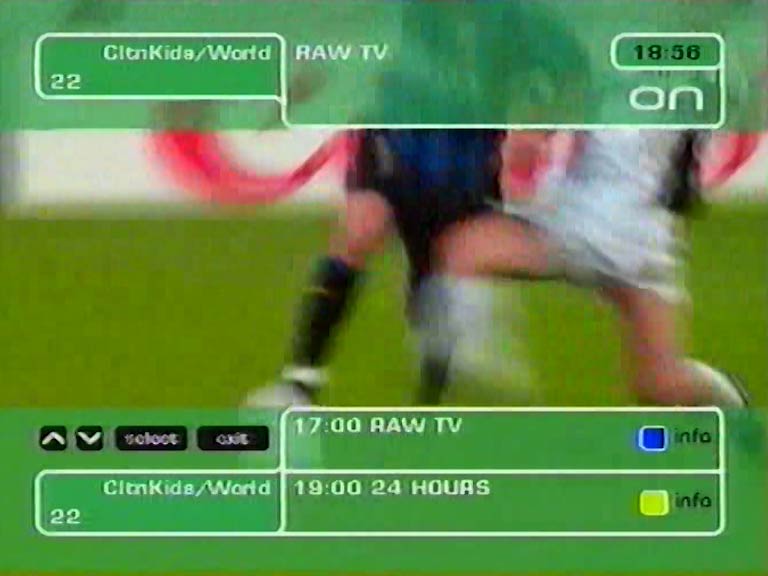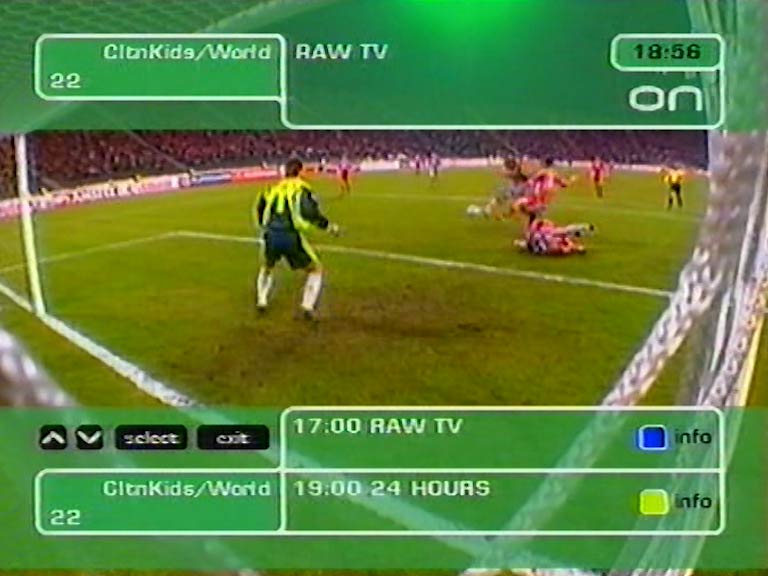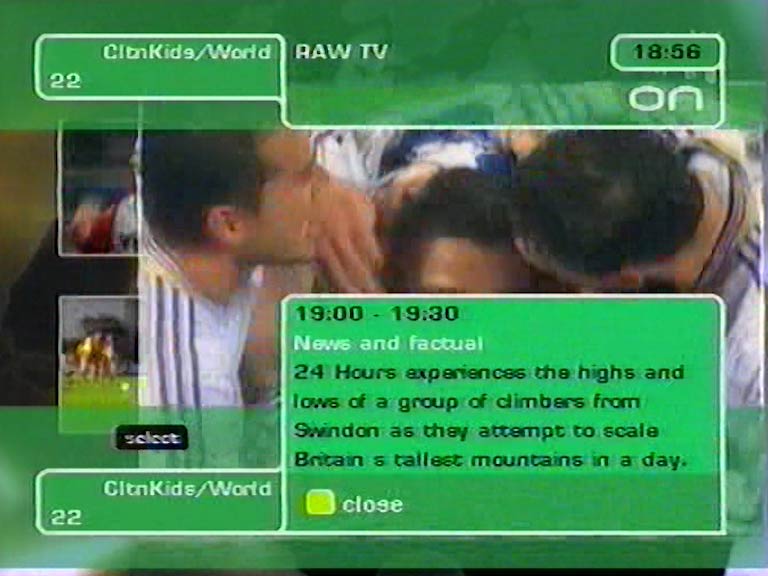Cable & Wireless Advert
New, it's not
Quality: HQ
Digital TV in the UK opened up a whole new world of television, including channels that show all the repeats we used to complain about before!
New, it's not
Quality: HQ
New, it's not
Quality: HQ
New, it's not
Quality: HQ
OnDigital began as a modest company called British Digital Broadcasting; a union of Carlton, Granada and BSB in early 1997. Over the course of the next 2 years, big changes were coming to the way the UK would watch television. The technical wizardry was going on behind the scenes at BDB while the viewing public happily flicked between the 4 available terrestrial channels, blissfully unaware that the future was on the horizon.
On the 24th of September 1998, On Digital was previewed at Live 98 at Earls Court in London, with the “set-top boxes” on display to the public for the first time, with several companies having fought for and won the tenders to manufacture them some months before, including Sony, Grundig and Nokia.
The OnDigital stand at Live 98 also featured Lee Hurst and other top comics performing at the “On Digital Comedy Club”. Officially launched on the 15th of November (with a ceremonial launching the following day when the Crystal Palace transmitter was floodlit), interest rocketed and the phonelines at On Digital recorded in the region of 75,000 calls from callers wanting to know details and prices. Over the next 16 months, it began offering free sporting events to subscribers including Mike Tyson’s 2 comeback fights and India-Pakistan Test Matches, as well as the UEFA Champions League and FA Premiership matches, and the launch of British Eurosport.
New, it's not
Quality: ST
New, it's not
Quality: ST
New, it's not
Quality: HQ
New, it's not
Quality: HQ
New, it's not
Quality: HQ
New, it's not
Quality: HQ
New, it's not
Quality: HQ
Some screen shots of the On Digital EPG



By Mid 2001, however, things started to look shaky for the all singing, all dancing home of the future of broadcasting, when it was rebranded ITV Digital. ITV itself became ITV1 and the range of channels started to fluctuate as new channels were added, but some old favourites disappeared. Taste CFN (previously known as Carlton Food Network and was available on cable for approx 7 years before launching on DTT) appeared to launch, shut down, relaunched with new unseen programming, then disappear for good, all within a few months. Subscriptions continued to rise but the apparent quality of the line up faded. Eventually, with a slow in subscribers and financial troubles, ITV Digital started coughing up blood and, within 2 years, had wheezed it last on the 18th of October 2002, with an estimated -£1bn in debts.
New, it's not
Quality: HQ
New, it's not
Quality: HQ
The switchover to digital television was simple if you knew how. For others, particularly the elderly and those who were not quite tech savvy, there was a solution. These adverts gave you details of how to change or speak to someone who could help you.
New, it's not
Quality: HQ
New, it's not
Quality: HQ
New, it's not
Quality: ST
New, it's not
Quality: HQ
New, it's not
Quality: HQ
New, it's not
Quality: HQ
Freeview was the next step up from the failed OnDigital. Freeview boxes began appearing in stores during 2003 to compensate and were snapped up all over the country. Freeview initially came with 40 or so channels and some radio stations. This menu increased over time as channels came and went and it’s estimated that there are over 200 free to air channels available at time of writing.
New, it's not
Quality: HQ
New, it's not
Quality: HQ
New, it's not
Quality: HQ
New, it's not
Quality: HQ
New, it's not
Quality: HQ
New, it's not
Quality: HQ
New, it's not
Quality: HQ
Freesat was an alternative to Freeview for those who either couldn’t get a decent signal on Freeview, or who had a satellite dish already from the BSB days. It offers pretty much the same as Freeview with a few extra channels.
New, it's not
Quality: HQ
New, it's not
Quality: ST
New, it's not
Quality: HQ
YouView provides access to free-to-air digital terrestrial television (DTT) channels (both DVB-T and DVB-T2 channels in common with the Freeview television platform) and to TV on demand (catch-up TV) services via a ‘hybrid’ set-top box (STB) purchased by users, connected with both a broadband internet connection and a normal television aerial. No contract is required, and there is no subscription charge. Catch-up and on-demand content is delivered over the internet, which may be chargeable by the Internet service provider (ISP), or subject to limits and fair usage clauses
New, it's not
Quality: ST
New, it's not
Quality: HQ